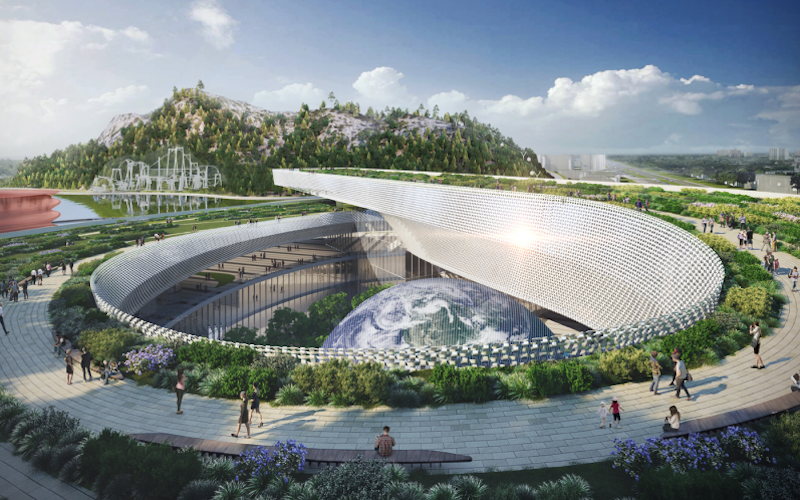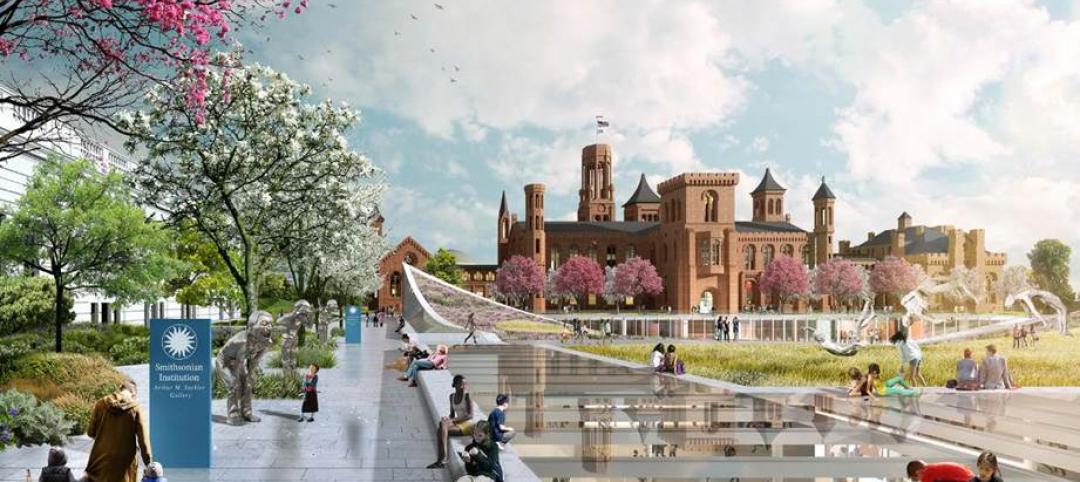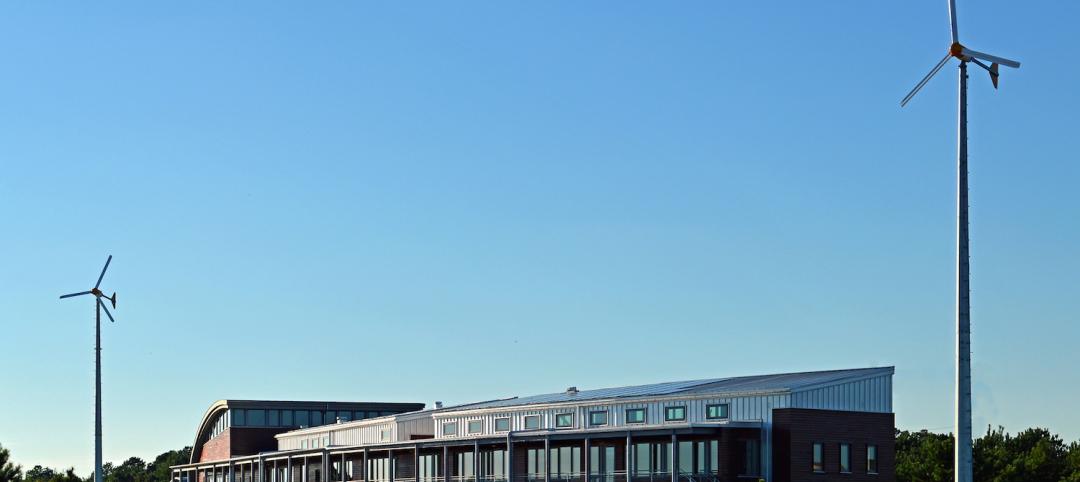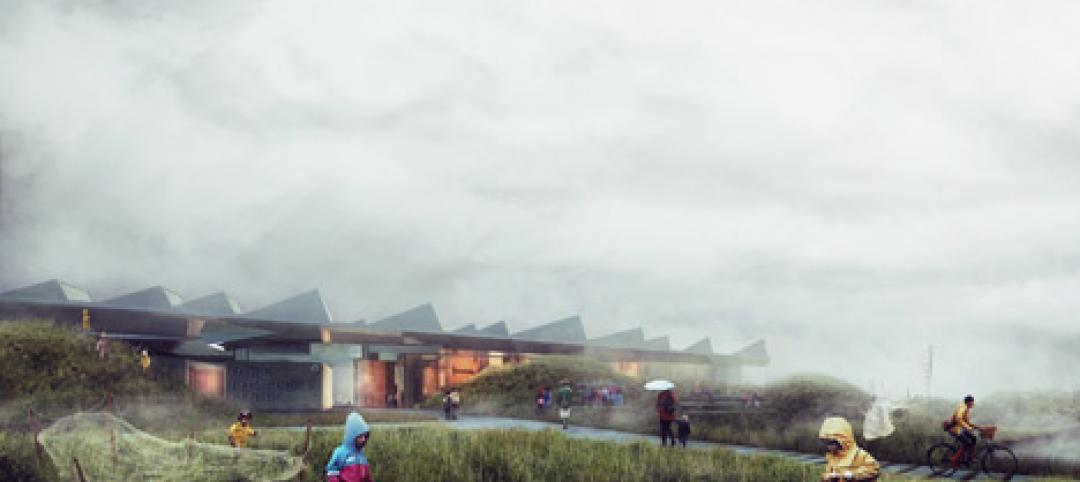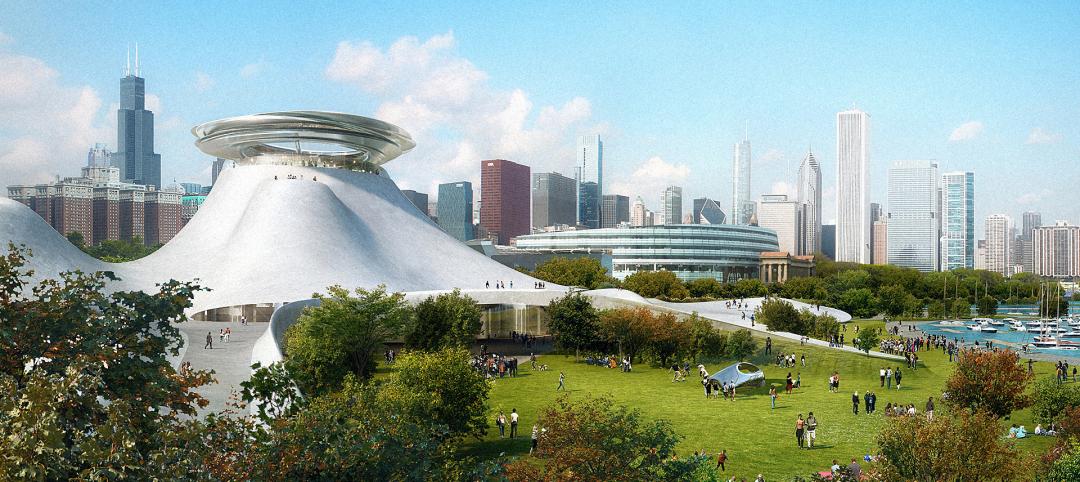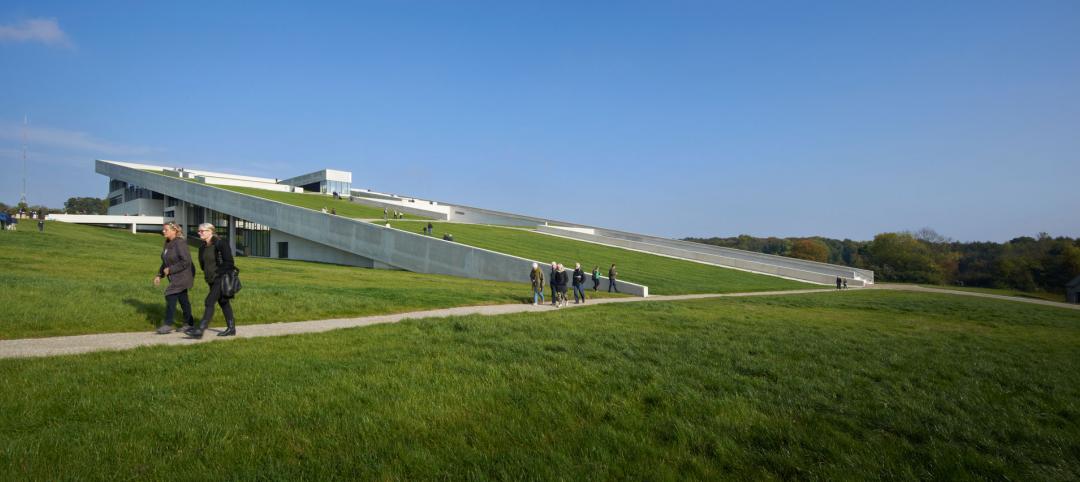Shan shui is a Chinese expression that, roughly translated, means the union of mountain and lake. It is this phrase that proved to be the inspiration for the new Suzhou Science & Technology Museum designed by Perkins+Will.
The museum will become the new centerpiece of a new cultural district in Shishan Park, located about 62 miles northwest of Shanghai. The museum sits at the foot of Lion Mountain and next to Shishan Lake (hence the shan shui inspiration) and will encompass 600,000 sf of space. Included in this space is a 66,700-sf industrial exhibition hall, where exhibits will highlight the role of industrial development.
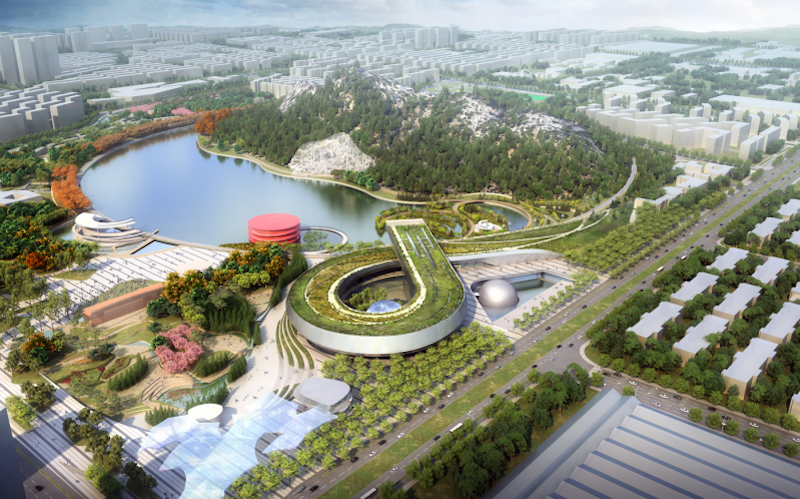 Rendering courtesy of Perkins+Will.
Rendering courtesy of Perkins+Will.
The ribbon-like form of the museum emerges from the base of Lion Mountain and twists upward before it turns back on itself to cantilever out over the edge of Shishan Lake. Several man-made, teardrop-shaped, planted Eco Islands will stipple the lake. These islands will act as a filtration system and be connected by a walkway to the museum.
Visitors can arrive at the museum from several approaches. Those arriving by subway will be guided into the museum along a shallow ramp to the circular promenade that surrounds the park. Those coming by car or bus will enter through a formal plaza with reflecting pools and gathering spaces dubbed the “Discovery Court.”
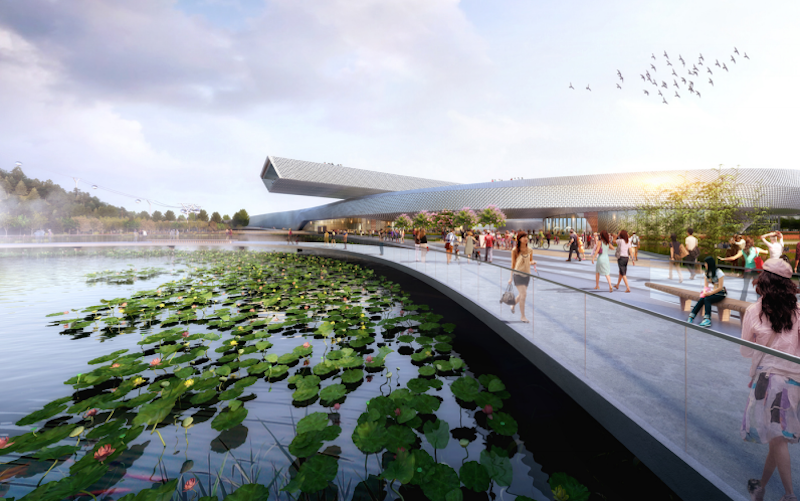 Rendering courtesy of Perkins+Will.
Rendering courtesy of Perkins+Will.
Once visitors enter the museum, via whichever approach they desire, they will be greeted by a three-story atrium adjacent to a sunken water-filled courtyard that includes several small planted islands meant to reflect the Eco Islands in Shishan Lake.
Each level within the museum has access to natural daylight. The museum’s third level comprises “Lion Mountain Terrace,” which stretches out over the Eco Islands and frames Lion Mountain in the distance. This isn’t the only way the museum highlights sustainability and the environment, though.
A “Life-Giving Forest” outside the museum provides an air filtration buffer to the city and a unique place for outdoor exhibits. Public pedestrian walkways where the museum meets the lake wind through the Eco Islands and the wetlands with signage that guide guests to explore water purification, storm water management, and sustainable living.
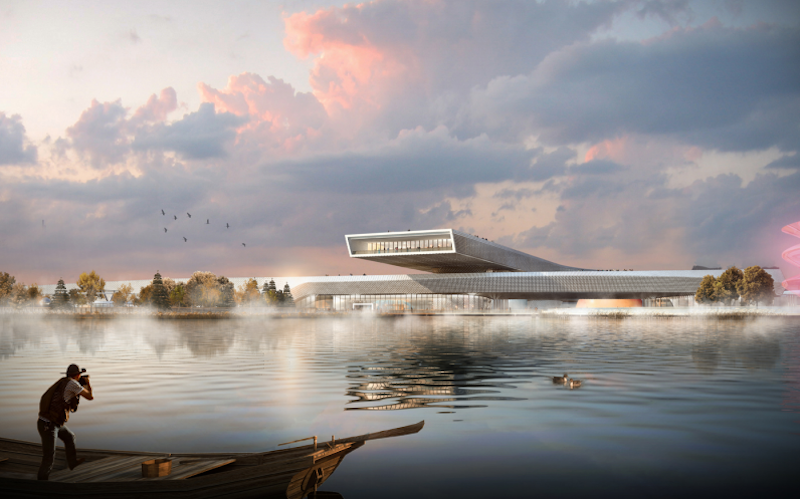 Rendering courtesy of Perkins+Will.
Rendering courtesy of Perkins+Will.
A 3D metal mesh skin transitions from opaque to transparent to control daylight and solar gain and permeable paving systems and bioswales allow rain water to percolate directly into the ground of be directed toward the planted vegetation to be filtered naturally. Additionally, the construction of wetlands and Eco Islands will improve the water quality of Shishan Lake and make it a healthier habitat for wildlife and visitors.
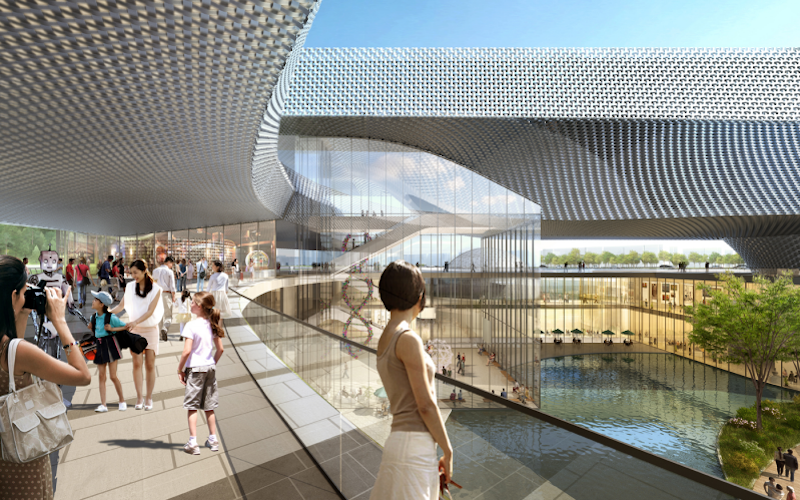 Rendering courtesy of Perkins+Will.
Rendering courtesy of Perkins+Will.
“Our design recognizes the importance of Suzhou in China’s commercial history, and underscores its role at the forefront of China’s emergence as a technology leader and innovator,” says Ralph Johnson, Global Design Director of Perkins+Will.
Perkins+Will previous design work in China includes the Shanghai Natural History Museum, which opened in 2015.
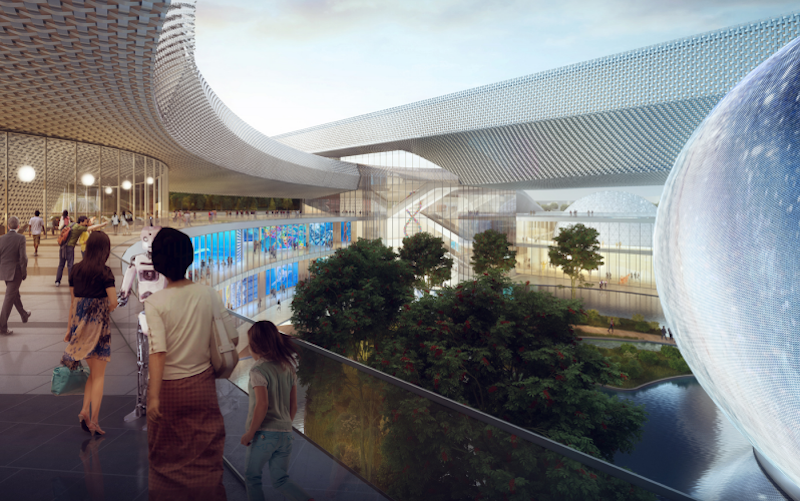 Rendering courtesy of Perkins+Will.
Rendering courtesy of Perkins+Will.
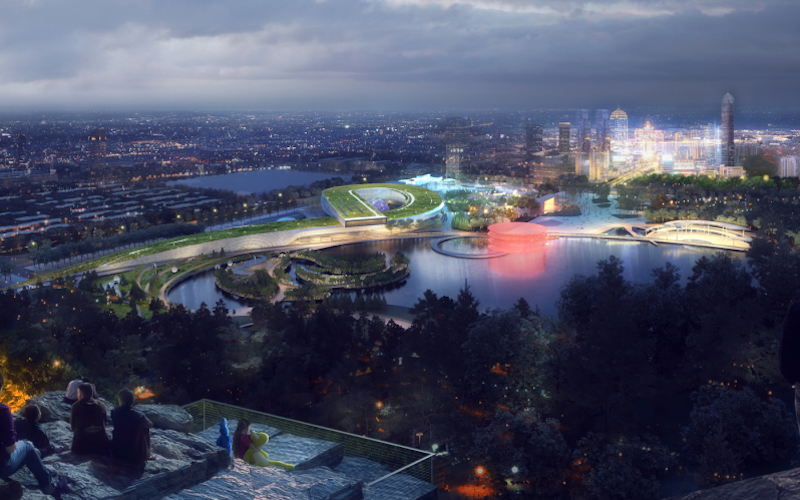 Rendering courtesy of Perkins+Will.
Rendering courtesy of Perkins+Will.
Related Stories
| Nov 14, 2014
Bjarke Ingels unveils master plan for Smithsonian's south mall campus
The centerpiece of the proposed plan is the revitalization of the iconic Smithsonian castle.
| Nov 12, 2014
Chesapeake Bay Foundation completes uber-green Brock Environmental Center, targets Living Building certification
More than a decade after opening its groundbreaking Philip Merrill Environmental Center, the group is back at it with a structure designed to be net-zero water, net-zero energy, and net-zero waste.
| Nov 7, 2014
NORD Architects releases renderings for Marine Education Center in Sweden
The education center will be set in a landscape that includes small ponds and plantings intended to mimic an assortment of marine ecologies and create “an engaging learning landscape” for visitors to experience nature hands-on.
| Nov 5, 2014
The architects behind George Lucas' planned Chicago museum unveil 'futuristic pyramid'
Preliminary designs for the $300 million George Lucas Museum of Narrative Art have been unveiled, and it looks like a futuristic, curvy pyramid.
| Nov 3, 2014
IIT names winners of inaugural Mies Crown Hall Americas Prize
Herzog & de Meuron's iconic 1111 Lincoln Road parking garage in Miami Beach, Fla., is one of two winners of the $50,000 architectural prize.
| Oct 29, 2014
Diller Scofidio + Renfro selected to design Olympic Museum in Colorado Springs
The museum is slated for an early 2018 completion, and will include a hall of fame, theater, retail space, and a 20,000-sf hall that will showcase the history of the Olympics and Paralympics.
| Oct 23, 2014
Prehistory museum's slanted roof mimics archaeological excavation [slideshow]
Mimicking the unearthing of archaeological sites, Henning Larsen Architects' recently opened Moesgaard Museum in Denmark has a planted roof that slopes upward out of the landscape.
| Oct 16, 2014
Perkins+Will white paper examines alternatives to flame retardant building materials
The white paper includes a list of 193 flame retardants, including 29 discovered in building and household products, 50 found in the indoor environment, and 33 in human blood, milk, and tissues.
| Oct 15, 2014
Harvard launches ‘design-centric’ center for green buildings and cities
The impetus behind Harvard's Center for Green Buildings and Cities is what the design school’s dean, Mohsen Mostafavi, describes as a “rapidly urbanizing global economy,” in which cities are building new structures “on a massive scale.”
| Oct 12, 2014
AIA 2030 commitment: Five years on, are we any closer to net-zero?
This year marks the fifth anniversary of the American Institute of Architects’ effort to have architecture firms voluntarily pledge net-zero energy design for all their buildings by 2030.


